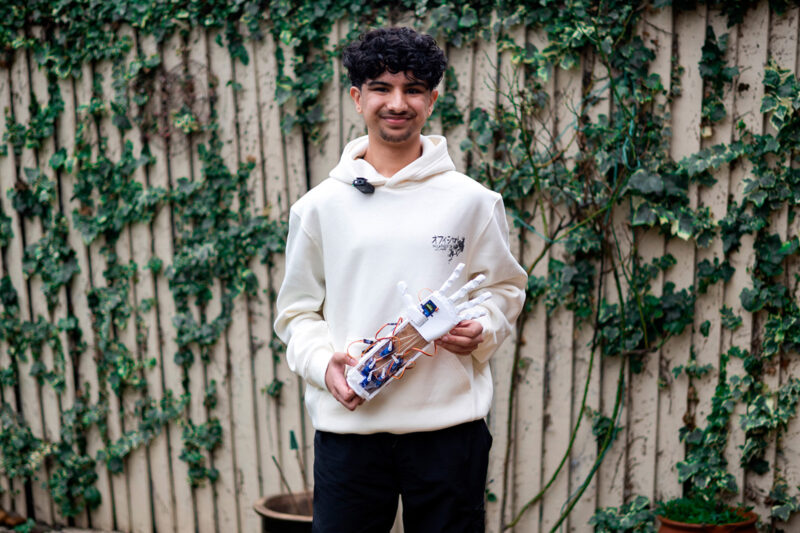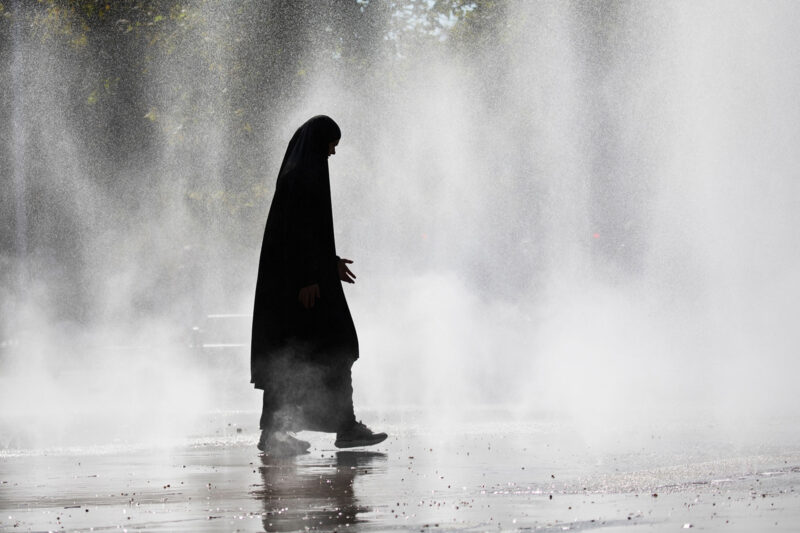What can a mock election at an east London state school teach us about the future of politics in the UK?
The way these students mobilised shows how Gaza has been a catalyst for wider political participation

In a slightly decrepit east London secondary school, nestled between a tube station and a church that doubles as a food bank, a group of teenage girls sit at a picnic bench in the playground, nonchalantly asking each other: “Who are you voting for tomorrow?”. The school is abuzz with commotion — not just because it’s almost the end of the academic year. A mock general election is taking place, just a couple of days before the rest of the country take to the polls.
In an attempt to engage young people in the civic life they will soon enter, mock general elections have become increasingly popular at secondary schools. As a teacher, I’ve witnessed all manner of fictional electoral mandates decided by teenagers in different schools: a staunch vote in favour of Brexit and, in 2019, a Corbyn-inspired Labour landslide to rival Tony Blair’s in 1997, about a decade before my students were even born.
Yet, despite wildly different outcomes, one thing has always been clear: my students have viewed themselves as entirely untouched by politics — even if their lives have been shaped by the economic and social policies that their parents and grandparents voted for.
But this time, things have looked very different. If this mock election of the next generation is anything to go by, Gaza has clearly been a catalyst for wider political participation.
It has changed my students — half of whom are Muslim. The dam keeping politics back from their teenage worldview until they are plunged into adulthood at 18 has been well and truly eviscerated by the smartphones they are tied to. Like the rest of us, they have spent the past nine months watching a genocide unfold in real time, greenlit by the people who are supposed to represent us. They are angry and they have questions.
I can only describe what I have seen as an awakening. My students have asked me questions about our local candidates, when a few months ago many of them wouldn’t have been able to tell me who the prime minister was. I’ve overheard comments and questions in the canteen such as, “All the parties are pro-Israel, so should we vote independent?”. There has been a concerted effort among some to boycott the mock election altogether because the very system it stands upon is rigged. A couple have lobbied their teachers to allow them to stand as independent pro-Palestine candidates.
Of course, much of this is a product of the east London context of the school: the students come from constituencies that very nearly elected independents over seasoned heavyweights last week — such as Leanne Mohamad in Ilford North. But there’s also something to be said here about the next generation’s relationship with politics and how this could change the political landscape of the UK more broadly.
The teenagers I teach were born under austerity in one of the poorest regions of the capital. Their short lives have been defined by cuts to public services, stagnating wages, insecure housing and a burgeoning cost of living crisis. And now, they’ve seen for themselves what our politicians are willing to support for their counterparts abroad. Politics is at the end of their fingertips, day in, day out. Platforms such as TikTok provide access to digestible political ideas which make today’s young people more politically conscious but also vulnerable to disinformation dressed up as the truth.
These students are also now more responsive to the ways they are marginalised at home — how poverty is manufactured by the elite, how they hold democratic power to change things and, crucially, how the answer might not lie in electing the same two parties ad nauseam.
We can already see this happening. Last week’s election results point to the collapse of the two-party duopoly. The election of five independent MPs, the record number of Green MPs and then that sobering Reform result all signify a change in the political landscape of the UK. Consider, too, the number of constituencies that have now become major battlegrounds with a mere few hundred votes between an independent candidate and an incumbent politician with the backing of a major party. It is clear that things look set to shift further in elections to come.
The youngest of the electorate have opted for alternatives to the status quo. In fact, other than among Muslims, one of the main areas that Labour haemorrhaged votes in last week’s election was those under 40 who, by and large, lent their vote to independents or smaller parties such as the Greens.
While the nation has been swept up in a red landslide (albeit shallow), the small sampling of east London teenagers I teach proved less enamoured by Labour, who came in second place behind an independent running on a pro-Palestine ballot. No doubt, as they grow up, my students’ politics will become more nuanced and perhaps they’ll fall into the same electoral habits of the generations that came before them — buying into the “lesser of two evils” philosophy or believing in a system they once disparaged.
But this generation is growing up already imbued with the knowledge that the system wasn’t built for them. If my students are anything to go by, politics in the hands of the teenagers of today will change the entire system as we know it.
 Newsletter
Newsletter













